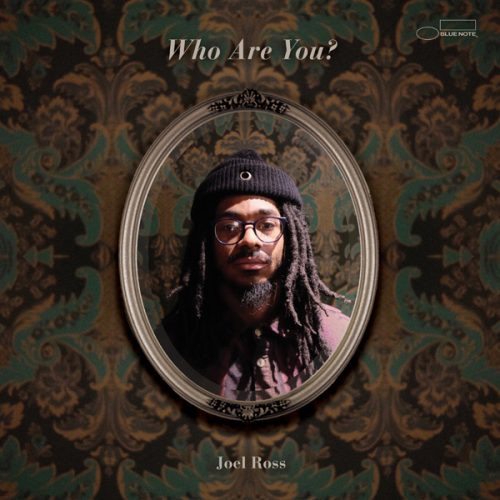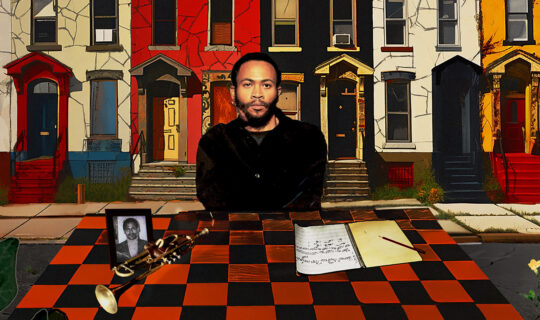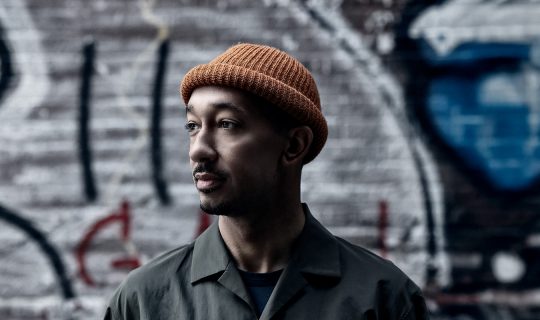October 22, 2020
Joel Ross nurtures his artistry in a continuum. The vibraphonist-composer lets melodies inform improvisation, and collective spontaneity inspire written composition. “I don’t believe in coming into anything with expectations,” he says. “As musicians, we’re just expressing ourselves.”
In 2019, the Brooklyn-based artist of out Chicago issued his Blue Note debut KingMaker to peer acknowledgment and wide critical acclaim. An introduction to his longstanding outfit Good Vibes, the album received nods from The New York Times’ Best Jazz of 2019, NPR Music’s Jazz Critics Poll and Rolling Stone’s 2019 Jazz Listener’s Guide. Now, expanding the breadth of his expression with his second release Who Are You?, the young artist has actualized his sound.
“This record is a culmination of our maturing – as people, as a band, within the music – it’s about figuring out who we are,” says Ross. The Good Vibes approach to music making teems with folkloric intimacy – melodic, percussive and spiritually resonant. Rather than taking solos, Ross contends the band improvises together, advancing the conversation by passing the mic. He and his fellow artists lean in to energy. They establish a mood, then follow where it takes them. “Now, everybody understands that you can do anything,” says Ross, “because any action is an invitation to follow another path.”
Such high-level trust and creative exploration demands contributions from like-vibed artists. Who Are You? features familiar Good Vibes associates Jeremy Corren on piano, Immanuel Wilkins on alto saxophone and Jeremy Dutton on drums, and introduces their newest collaborator, Kanoa Mendenhall on bass. “Once Kanoa joined, I felt I finally had the group sound that I wanted,” says Ross.
Inspired by communication through storytelling – a method he absorbed, in part, working with such creative forces as Ambrose Akinmusire, Marquis Hill and Makaya McCraven – and with input from producer Walter Smith III, Ross assembled the album’s narrative in halves. Tracks 1-7 provide setting, as well as character introductions; tracks 8-15, plot twists. Each artist advances the spirit of risk-taking, while maintaining Ross’ vision for story structure.
“I guess it’s becoming a theme to have a tune by Dutton on the record,” he says. “I felt that ‘Dream’ was the perfect tune to set up the entire album.” That syncopated mood-building intensifies on “Home.” While improvising, both Ross and Corren intentionally lock up on melodic phrases as a means of maintaining the narrative.
Gaining momentum on “More?,” the artists engage simmering restraint throughout trades among Ross, Wilkins and Corren. The pianist’s expansive, rotating color palette illuminates Wilkins’ melodic hipness. How they stretch together becomes part of the story. “It’s not like, play the melody, somebody takes a solo, then somebody takes another solo and head out,” says Ross. Collective energy elicits strong choices that include the tune’s unexpected finish: “More recently, Immanuel and I have been bringing our compositions back to swinging,” says Ross. “I’d never be so explicit to tell Dutton, ‘Okay, swing,’ but I give everyone a strong enough hint to know that’s what I’m going for.”
“Marsheland” concludes the first half of the record. Throughout the track, the artists maintain a level of intensity Dutton sets from the start. Moving in matrices of sound, the Houston-born drummer weaves a netting of intention, comprising explicit and implied articulations, steady and emergent pulses – all working in service of the moment’s energy.
The most tender of melodies emerges on “Gato’s Gift,” a tune written in large part by multi-instrumentalist and composer Gabrielle Garo. She composed most of the tune’s information before her 10th birthday. “I didn’t really add anything to the melody beyond the ending line,” says Ross, acknowledging the bar of 3/8 within the form. “I just thought it was a really beautiful tune.”
“Gato’s Gift” is one of many occasions on Who Are You? reflecting the presence of women within Ross’ artistry. Harpist Brandee Younger provides layers of harmonic and textural resonance on multiple tracks, including in duo context with Ross on “King’s Loop,” a short melody he transcribed from one of singer-guitarist Emily King’s Instagram posts. Ross wrote “The Nurturer” for The Jazz Gallery’s artistic director Rio Sakairi. “She’s been nurturing the whole scene for a while now,” says Ross. And Mendenhall’s persistent expression enhances the foundational role that wields tremendous influence in any ensemble.
“She slows us down,” says Ross. “A group of guys can get competitive: ‘Yeah man, that’s hostile. That’s killing.’ And you’re just not gonna force Kanoa to do that.” He asserts, however, the understated architecture of her expression isn’t for its lack of strength. “She is one of the strongest players I’ve ever met,” he says. “And I appreciate how firm she is in her intention. That, in turn, directs us in how we make decisions as we play.”
More than a nod to his hometown’s influence, “3-1-2” serves as an anthemic love letter to the Chicago scene. Without realizing it, Ross wrote the city’s famed area code into the form, repeating the melody three times, the middle section once and the ending twice. The track features another moment on the recording that invites Good Vibes to come on back to swinging. “It sounded like some old Kenny Garrett type stuff,” says Ross. “I just wanted to play the melody and swing out a little bit.”
While the first half of Who Are You? provides plenty of improvisational showcasing, Ross acknowledges the second half focuses almost exclusively on the written compositions – a tactical move on his part. “I’m not concerned with whether people think this album is or isn’t doing something,” he says, “For me, the record was more about the compositions than how we were passing along through the tunes. It’s an album of music. It’s just a snapshot in my mind. Sit and listen.”







